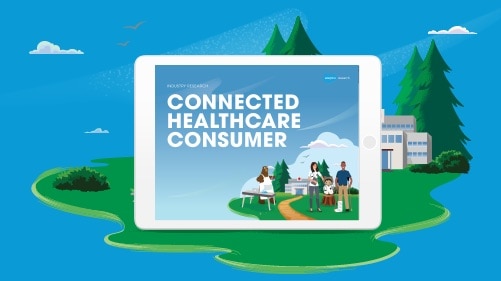For decades, healthcare consumers have struggled to understand and navigate a complex, heavily-siloed ecosystem of providers, insurers, pharmaceutical companies, and medical device companies. But as digitalization and connected experiences become the norm across industries, healthcare and life sciences industries are shifting to meet consumer demands for new capabilities and improved engagement.
But are they shifting fast enough? To find out, Salesforce Research surveyed nearly 6,000 global healthcare consumers about their expectations and experiences and published the results in our Connected Healthcare Consumer report. We asked:
- What are the common challenges healthcare consumers face in receiving care?
- What is the desire for real-time communication?
- Which factors are impacting trust in healthcare and life sciences organizations?
- What do consumers think about emerging trends in healthcare and life sciences, including artificial intelligence (AI)?
Discover some of the most eye-opening findings from the report below.
What are healthcare consumers’ biggest pain points?

Given the complexities of the healthcare and life sciences industries, one thing is (unsurprisingly) clear: The majority of healthcare consumers find difficulty in navigating it all. Over half of consumers don’t know how to access a comprehensive health record, and nearly six in ten have felt unclear about the medications, practitioners, or procedures an insurer covers.
What’s more, only 40% of consumers say the communications they receive from healthcare and life sciences organizations feel relevant to them. These distanced interactions are a far cry from the thoughtful attention they want — and as other industries become highly sophisticated at fostering personalized experiences, healthcare and life sciences lag behind.
What do healthcare consumers really want?

1. Better access to care
Social determinants of health, such as family support, literacy, and access to transportation, can greatly impact an individual’s wellbeing. Many healthcare consumers are interested in options that make care more convenient and accessible, like walk-in clinics and in-home visits. It makes sense, given that 42% say life circumstances have caused them to miss an appointment with a provider.
2. Technology-based conveniences
When it comes to emerging platforms including mobile apps and voice assistants, digitally-native millennials and Gen Zers are significantly more inclined than older generations to express interest. As the younger generations grow older, the demand for technology-based conveniences will only continue to increase.
3. Real-time engagement
The trend continues when you look at communication preferences.

Sixty-eight percent of consumers now expect companies to engage with them in real time. Among healthcare consumers, immediacy appears to be particularly important to millennials and Gen Zers, who are more likely to want to text, instant messaging, and video chat capabilities — which provide instantaneous feedback and are commonly used on-the-go.
Industries like retail already engage consumers in real time, but adoption is slow among traditional healthcare and life sciences organizations. However, some startups like One Medical and JustAnswer are taking advantage of the unmet consumer need, competing on real-time features like live chat and 24/7 video visits.
What are the biggest opportunities with direct-to-consumer healthcare?
Nearly half of consumers regularly buy at least one product directly from a brand — known as direct-to-consumer (D2C). Providers have been the primary vehicle for pharmaceutical and medical device sales, but consumer-driven internet research opens new windows of D2C opportunity for healthcare and life sciences companies.
Thirty-six percent of consumers believe they will receive better care from providers if they first conduct their own research, and 47% have asked their provider about a medication based on their research. These numbers are even higher for millennials and Gen Zers (43% and 53% respectively), suggesting the total percentages may grow as more digital natives come of age.
What does the future of healthcare look like?
It’s no secret that providing quality care at scale while keeping costs down has been a major challenge for healthcare companies. Could artificial intelligence (AI) help? According to our survey, healthcare consumers believe that AI could certainly help improve the experience.

In particular, consumers believe in AI’s ability to increase efficiency and deliver personalized recommendations, by tackling appointment scheduling, health reminders, and cost-saving recommendations. This confidence is in-line with what we’ve found to be AI’s particular strengths in handling routine tasks and quickly processing large amounts of data.
Find out more
For a deep dive into what healthcare consumers expect, what’s working, and what’s not, check out the full Connected Healthcare Consumer report and learn how you can improve your relationship with healthcare consumers.
For highlights, check out the infographic below or grab the embed code to share it.

Share this image on your site





























